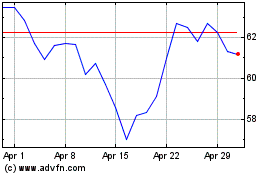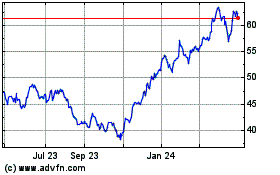Citigroup Reports Higher Earnings -- 2nd Update
April 15 2021 - 9:42AM
Dow Jones News
By Orla McCaffrey
Citigroup Inc. on Thursday reported sharply higher first-quarter
profit and said it is shutting down most of its consumer-banking
operations in Asia, Europe and the Middle East.
The bank posted a profit of $7.9 billion, or $3.62 per share,
well above the $2.60 per share forecast by analysts polled by
FactSet. A year earlier, Citigroup had reported a quarterly profit
of about $2.5 billion, or $1.05 a share.
Citigroup also said it would exit its consumer operations in 13
countries, mostly across Asia, to focus on wealth management and
other businesses.
Jane Fraser, who took over as chief executive officer last
month, said in a statement that those consumer banks were excellent
businesses, but "we don't have the scale we need to compete." She
said Citigroup would continue to invest in wealth management and in
the businesses that work with corporate clients in Asia.
Citigroup is a giant on Wall Street but it is relatively small
in U.S. consumer banking, a combination that some analysts and
investors have criticized. Ms. Fraser said in January that the bank
would restructure the businesses that manage money for wealthy
customers, with the goal of getting to clients earlier and keeping
them as they grow richer. The bank said Thursday that it will
operate consumer banking in four "wealth centers" where it expects
strong growth for the wealth-management business: Singapore, Hong
Kong, the United Arab Emirates and London.
Revenue fell 7% to $19.3 billion. That was still ahead of the
$18.8 billion analysts had expected.
During the same period last year, Citigroup and other big banks
were scrambling to determine how many billions of dollars to set
aside for loan losses they feared the coronavirus pandemic could
fuel.
The New York bank released $3.85 billion in reserves, a major
driver of earnings in the first quarter and a sign the bank's
outlook on the economy has improved. The bank released $1.5 billion
in the fourth quarter.
Citigroup and other large banks have started to discharge some
of the funds earmarked last year to cover loan losses, boosting
earnings a year after coronavirus concerns burned their
profits.
The reserves weighed on earnings for much of last year, when
financial institutions believed that elevated numbers of businesses
and consumers would miss loan payments. But a resurgent U.S.
economy, plus trillions of dollars in government stimulus and
ramped-up Covid-19 vaccine distribution, means banks expect far
fewer of those losses to materialize.
Citigroup shares have risen about 18% since the beginning of the
year. The KBW Nasdaq Bank Index, which tracks shares of the largest
lenders, is up 26% so far this year, compared with a 10% gain in
the S&P 500.
A crazy quarter in markets has helped power the big Wall Street
banks. JPMorgan Chase & Co. and Goldman Sachs Group Inc. both
recorded record quarterly profits on Wednesday. Citigroup enjoyed a
46% jump in investment banking revenue, largely from a surge in
underwriting stock offerings, including special-purpose acquisition
companies. But its revenue from advising companies on deals was
down, and trading revenue was essentially flat, rising just 1%.
Expenses increased 4% to $11.1 billion, in part because of the
bank's effort to revamp its risk and control systems. Investors
have been watching that line closely after regulators ordered
Citigroup to make significant changes in its risk systems.
Earnings in the institutional clients group, which includes
investment banking and trading, rose 64% to $5.9 billion, but
revenue fell 2% to $12.2 billion.
The consumer bank reported profit of $2.2 billion, compared with
a loss a year earlier of $740 million. Revenue fell 14% to $7
billion.
Write to Orla McCaffrey at orla.mccaffrey@wsj.com
(END) Dow Jones Newswires
April 15, 2021 09:27 ET (13:27 GMT)
Copyright (c) 2021 Dow Jones & Company, Inc.
Citigroup (NYSE:C)
Historical Stock Chart
From Mar 2024 to Apr 2024

Citigroup (NYSE:C)
Historical Stock Chart
From Apr 2023 to Apr 2024
